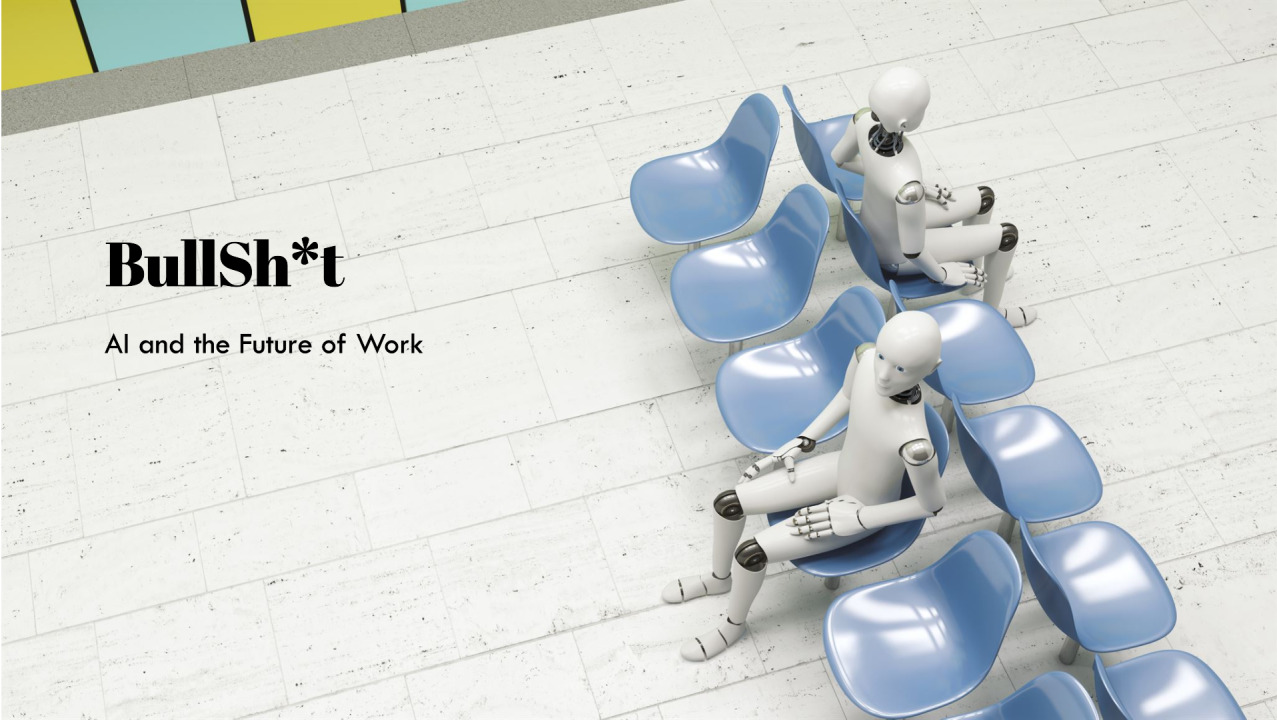19 Jan

I live and breathe AI, blockchain, crypto, and all things tech. But let’s cut through the hype: the idea that AI is about to make our working lives better, easier, or even tolerable? Total and utter crap. Sorry, but it needs to be said.
Take a stroll through the glossy reports churned out by McKinsey & Company Boston Consulting Group (BCG) , Deloitte Consulting, and many others, you’ll find grand proclamations about how AI is a revolution for workplace. Even Keir Starmer, the UK’s Prime Minister, has hopped on the AI bandwagon, hailing innovation as the key to economic growth1. As Rafael Behr noted in The Guardian , Starmer predicts that “artificial intelligence will transform Britain’s economy in the coming years.”
But here’s the ugly truth: AI won’t set workers free—it’ll just chain them to being allocated more work. It’s not about AI freedom for creativity, leisure, or to spend more time with the family. It’s about productivity to save costs and increase revenue. CEOs see AI as the holy grail of efficiency, where they can squeeze more productivity from employees without paying more. Let’s be clear: no one at the top is planning to let AI give workers the time or freedom they deserve.
The Reality of AI in the Workplace
Let’s not pretend that the world of work is about to become a utopia. The consultancy reports talk about AI unlocking potential, but what they mean is this: you’ll be expected to do the same job—or more—with half the time and half the resources. AI-powered monitoring tools will ensure there’s no slacking. Your keyboard, mouse, and every digital step you take are going to be tracked.
And if you think this is just paranoia, think again. AI systems are already being deployed to measure productivity in ways that would make George Orwell blush. From tracking how long you spend on emails to analysing your tone of voice in video calls, AI isn’t freeing workers—it’s creating a new level of tiedown.
A Tale: Finance Contractors Efficiency Trap
A friend of mine, a finance contractor, had the system figured out. An unqualified accountant, he would go from contract to contract, creating massive efficiencies in his first few months. By deploying excel tools and streamlining business processes, he’d get his daily, monthly, and quarterly tasks done in 60-70% of the time. But here’s where it gets interesting.
Instead of reporting his extra capacity, he played the long game. He gave the impression that he was 100% occupied, using the remaining time for personal pleasure movies, gaming, and whatever else struck his fancy. Smart? Absolutely.
But it didn’t stop there. Eventually, he’d get bored. After a few months of “efficiency,” he’d move on to the next challenge, leaving behind a legacy and in some cases the automation was never handed over. It was a masterclass in personal strategy—he profited with time from his ingenuity, but not in a way corporate hierarchy could celebrate. Why? Because he dared to challenge the façade of constant busyness that companies rely on – as a measure of productive value, where unit cost calculation now need to be be fundamentally be revisited now.
This isn’t an isolated case. Workers who find ways to leverage AI and automation to reduce their workload are rarely rewarded for their ingenuity. Efficiency doesn’t lead to recognition—it leads to fear that your value is diminishing.
Outsourcery and the Global Race to the Bottom
Next step: corporate outsourcery. The efficiencies created by workers like my friend aren’t staying local—they’re being commoditised and shipped off to the cheapest global bidder. Firms like Arbree Solutions in Bangladesh are becoming the new AI process powerhouses, offering businesses the same outcomes at a fraction of the cost.
Even agencies like AI Automation Agency (AAA) are navigating this tricky terrain. While they provide cutting-edge solutions, they’re often caught between delivering innovation and catering to clients who see efficiency as an opportunity to cut costs rather than invest in their workforce.
And what does this mean for workers in the UK, Europe or the US? It means an ever-increasing pressure to stay competitive. The threat isn’t just AI—it’s AI combined with global outsourcing. The LinkedIn “#OpenToWork” badge has never felt so ominous for so many.
Corporate Greed Disguised as Innovation
Let’s not beat around the bush: corporate greed is driving this AI obsession. Elon Musk is the poster CEO for this trend. The man who built Tesla and SpaceX is also the man who’s pushed workers to their limits. With the rollout of tools like X.ai, which promise productivity gains which will ultimately squeeze employees harder.
Musk isn’t alone. Across industries, CEOs are wielding AI not to enhance work-life balance but to strip workers of their value. Efficiency is just a buzzword for “do more with less.” The language of innovation has been hijacked to justify exploitation.
Social Anarchy or Universal Basic Income?
Here’s the hard truth: if we continue down this road, the workforce is heading towards a breaking point. In a decade, we could be looking at one of two futures:
- Social Anarchy – Millions out of work, a fractured society, and rising resentment as the wealth gap becomes unbearable. Imagine a world where the workforce feels betrayed, where people are pushed to desperation because the system has failed them.
- Universal Basic Income – A solution where people are guaranteed a safety net to live alongside automation. But let’s be real: with the ultra-rich mastering tax havens and dodging their share of responsibility, who’s going to fund it?
The likelier scenario is increase cost of living challenge. Without significant changes to (forced or voluntary) corporate responsibility and an universal tax services we’re heading for a dystopia where the few prosper at the expense of the many.
The CEO’s Choice
So here’s the challenge for CEOs: do you want to be remembered as the leaders who drove humanity into despair, or as the ones who used AI to build a better world? You have a choice:
- Invest in people alongside AI, creating a cohesive global economy where technology enhances the real value of people lives.
- Or weaponise AI for profit exploitation, sparking the next industrial revolution and leaving millions in despair.
The clock is ticking, and the smell of crap in the AI room is only getting stronger. It’s time to stop talking about AI as a saviour and start addressing the reality of how it’s being used. If we don’t, the AI revolution might just end up being the next great lie we tell ourselves.





Ainul Islam
January 19, 2025